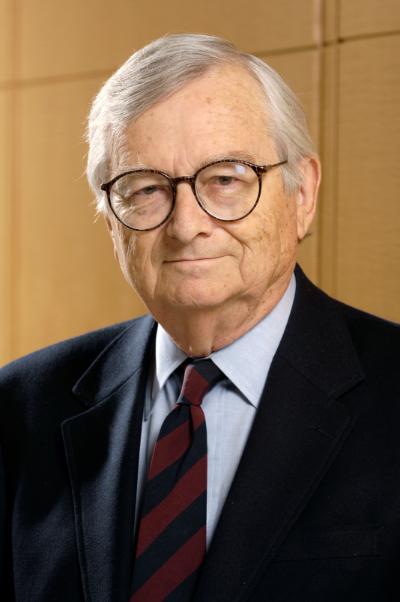
Distinguished Retired Law Professor Gideon Kanner passed away on Nov. 22, 2023 at the age of 93. A lion among eminent domain attorneys, Kanner joined the LMU Loyola Law School faculty in the midst of a celebrated career as an appellate attorney and made an indelible mark on the law school during his many years as a professor before returning to private practice.
Kanner was a professor of Eminent Domain, Land Use Controls, and Property as a full-time, tenured professor from 1974-1989, continuing to teach Eminent Domain after retiring. In a special 1991 “Tribute to Gideon Kanner” edition of the Loyola of Los Angeles Law Review on the occasion of his retirement, legal luminaries such as Stanley Mosk and former LLS Associate Dean Gerald F. Uelmen paid homage to Kanner.
“Gideon Kanner is one of California's great lawyers,” wrote California Supreme Court Justice Mosk. “He is thoughtful, articulate, often innovative, but most importantly, he is truly dedicated to the judicial process and the rule of law in our society.”
Uelmen carried on the tribute in a segment titled “Gideon Kanner: The Persistent Advocate,” writing, “Gideon brought a unique perspective into the classrooms of Loyola. He was not a dispassionate academic, and never pretended to be one. He had strong views on nearly every subject he taught, and he loudly proclaimed them. At the same time, he encouraged students to proclaim opposing views just as loudly and forthrightly. For Gideon, the classroom was a microcosm of the courtroom, where truth was exposed by two adversaries challenging each other's arguments.”
Kanner was a founder and president of the California Academy of Appellate Lawyers (CAAL), which spawned the creation of the Los Angeles County Bar’s Appellate Courts Committee and the American Academy of Appellate Lawyers. He was internationally known for his expertise in eminent domain law, serving as a consultant on the matter for the California Law Revision Commission and other bodies. He was the editor and publisher of Just Compensation, a monthly periodical on eminent domain. He wrote myriad law review articles on eminent domain, land use, and property law in addition to his significant litigation work.
Kanner was the recipient of myriad awards, including the Shattuck Memorial Award of the American Institute of Real Estate Appraisers for his outstanding contributions to appraisal literature, as well as a Harrison Tweed Award for Special Merit in MCLE for his teaching and writing in land-use law. He was a rare American scholar awarded a British Academy Grant to co-chair a conference on eminent domain. Conversely, the Brigham-Kanner Property Rights Prize at William & Mary Law School is named in his honor as a tribute to his lifetime contributions to private property rights.
Known for his expertise on a range of legal topics, he was a sought-after media commentator on everything ranging from eminent domain to judicial evaluation. Along with Uelmen and California Supreme Court Justice Otto Kaus ’49, he appeared on a 1987 panel “Retaining Good Judges,” which aired on C-SPAN. He wrote on legal topics for the Los Angeles Times, Wall Street Journal, National Law Journal and Los Angeles Daily Journal, where his name was frequently invoked. One 2018 column noted that Kanner was “a law professor, property rights advocate, and appellate lawyer extraordinaire who probably needs no introduction (especially given that his wit and wisdom continue to grace these Daily Journal pages).”
Kanner, a child survivor of the Nazi Holocaust, leaves behind his wife Stephanie, three children, four grandchildren, two great-grandchildren, a wide extended family, many dear friends, and scores of colleagues -- all who will miss him deeply. A private burial was held at Mount Sinai Memorial Park. Family and friends will gather at a future time to celebrate his amazing life; more information about that will be shared when available. (The Daily Journal’s obituary of him is available online.)
“Professor Kanner challenged, provoked, and at times scared his students into achieving their potential,” proclaimed his tribute law review edition’s opening note. And for that – and much more – he will always be remembered.